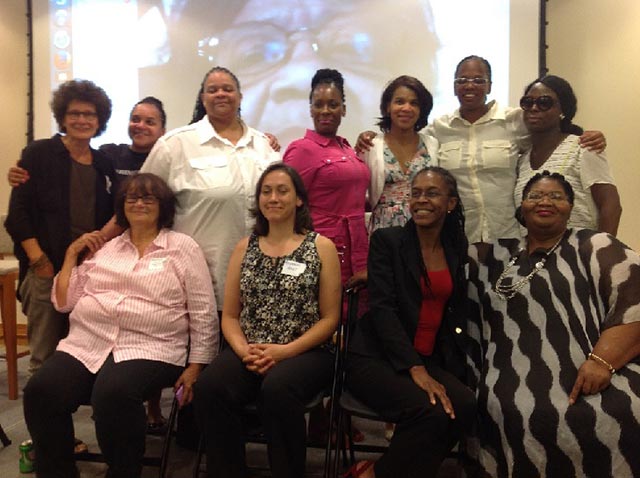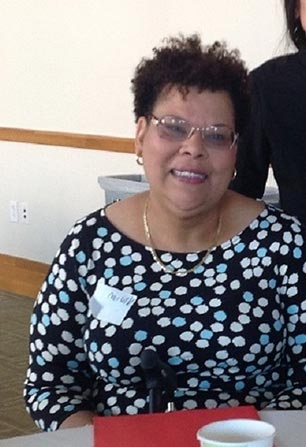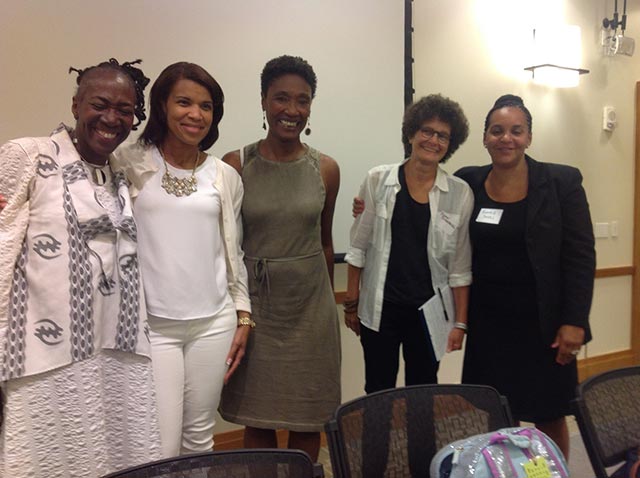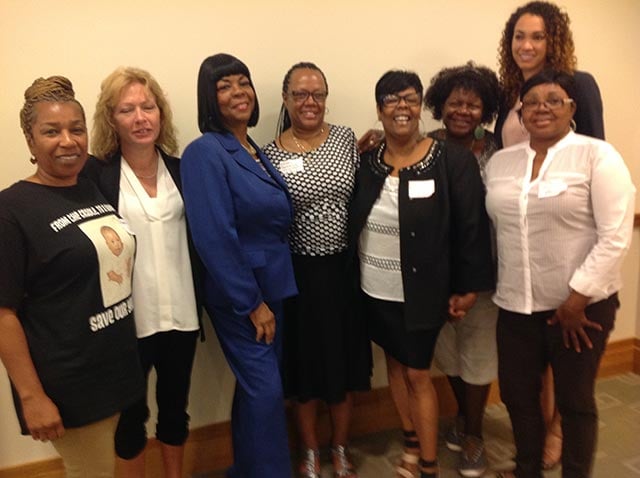
Honest, paywall-free news is rare. Please support our boldly independent journalism with a donation of any size.
“Women have always been the change agents of our society,” said Vivian Nixon, executive director of College and Community Fellowship, an organization committed to educational advancement for women with criminal record histories and their families.
Nixon was keynoting the landmark conference, FreeHer, in Cambridge, Massachusetts, August 4 and 5, where more than 43 formerly incarcerated women and their allies convened to rally an audience of 300 at Harvard Law School’s Charles Hamilton Houston Institute for Race and Justice. Leaders from across the country highlighted why this is the time for the United States to fund and support strategies to decrease the number of women behind bars and to end the mass criminalization of Black and poor women.
Women’s incarceration has not been fully addressed, however. Women are the fastest growing segment of the prison system.”
Nixon had barely landed from a whirlwind week, the culmination of her years of fighting to return federal Pell Grants to prisoners. Her activism had landed her a seat at the table with Secretary of Education Arne Duncan and Attorney General Loretta Lynch. She was at the Maryland Correctional Institute-Jessup on July 31 as the Obama administration unveiled a pilot program that will allow a group of prisoners to use federal Pell Grants to fund their education behind bars. Nixon also urged the FreeHer audience to fight for the Restoring Education and Learning (REAL) Act, far-reaching legislation sponsored by Maryland congresswoman Donna Edwards and others that would reinstate Pell Grant eligibility for federal and state prisoners. She said her path from incarceration to national leader taught her that “education is a path to escape the cycle of poverty and criminal recidivism.”
 Vivian Nixon. (Photo: Jean Trounstine)Nixon was passionate about the problem: “When we include probation, 7 million people are experiencing mass criminalization and racial discrimination. … Women’s incarceration has not been fully addressed, however. Women are the fastest growing segment of the prison system.” According to the Sentencing Project, the lifetime likelihood of imprisonment for women is 1 in 56. But the likelihood increases to 1 in 19 for Black women; 1 in 45 and 1 in 118 for Hispanic and white women, respectively. According to a Bureau of Justice Statistics special report, “The number of children under age 18 with a mother in prison [has] more than doubled since 1991,” and, “Sixty-four percent of mothers in state prisons lived with their children before they were sent to prison, compared to 47 percent of fathers.”
Vivian Nixon. (Photo: Jean Trounstine)Nixon was passionate about the problem: “When we include probation, 7 million people are experiencing mass criminalization and racial discrimination. … Women’s incarceration has not been fully addressed, however. Women are the fastest growing segment of the prison system.” According to the Sentencing Project, the lifetime likelihood of imprisonment for women is 1 in 56. But the likelihood increases to 1 in 19 for Black women; 1 in 45 and 1 in 118 for Hispanic and white women, respectively. According to a Bureau of Justice Statistics special report, “The number of children under age 18 with a mother in prison [has] more than doubled since 1991,” and, “Sixty-four percent of mothers in state prisons lived with their children before they were sent to prison, compared to 47 percent of fathers.”
Nixon declared that “Locking up women means paying the tab for the care and shelter of kids.” Her call for activism echoed Alice Walker from In Search of Our Mother’s Gardens: Those who fight for women’s justice are “womanish,” she said. “Freedom and justice for all means every woman,” she added. “We care about all oppressed peoples, and we must turn the current moment into a movement.”
Building a Network
FreeHer is an attempt to turn this moment into a movement – at a time when criminal injustice is undeniable nationwide, and the leadership of Black women is crucial to justice. The term is the brainchild of Andrea James. James, a founding member and executive director for Families for Justice as Healing (FJH), is a formerly incarcerated woman, former attorney and current Soros Justice Fellow. Her intention is to build a network of formerly incarcerated women and their allies to create change through action.
James met many compatriots when she was sentenced to 24 months behind bars and served time at the Federal Correctional Institution at Danbury, the women’s prison “camp” made famous by Piper Kerman’s Orange is the New Black. James described that experience, collaborating with other incarcerated women, and the development of FJH in her book, Upper Bunkies Unite: And Other Thoughts On The Politics of Mass Incarceration, published in 2013. Since her release in 2011, she has worked relentlessly, traveling throughout the country to connect with other leaders.
Her Soros fellowship is “an incredible opportunity” to build this network, James told Truthout. She now becomes one of Open Society’s core change-makers: “challenging the overreliance on incarceration and extreme punishment, and ensuring a fair and accountable system of justice.”
Last year, James and members of FJH, held a rally in Washington, DC, to bring attention to the needs of female prisoners, unjust sentencing, and the inequities of justice, and to demand an end to the mass incarceration of women.
The FreeHer Conference, this year, was the kickoff for James’ Soros Justice project. The Open Society Foundation is funding James, one of only 15 to be so honored by the foundation this year, to create a national network.
In an interview, James said she aims to expand awareness of how prison and jail impact women, their children and their communities: “My purpose is to connect those I have met throughout the country, who are doing work to restructure the criminal justice system, and to bring on board other formerly incarcerated women – with the goal of giving everybody a bird’s-eye view of what’s going on.” To that end, James organized the conference with panels according to theme, and panel by panel, the conference speakers articulated both current activism and ideas to inspire leaders to future action.
 Andrea James, FreeHer visionary, (right to left) with national activists Susan Rosenberg, Tina Reynolds, Kemba Smith and Deborah Small, from the panel “Why We’re Here.” (Photo: Jean Trounstine)
Andrea James, FreeHer visionary, (right to left) with national activists Susan Rosenberg, Tina Reynolds, Kemba Smith and Deborah Small, from the panel “Why We’re Here.” (Photo: Jean Trounstine)
Ending the Criminalization of Women
Kemba Smith (pictured above) never touched a drug but was the girlfriend of a man who sold drugs, and still, in 1994, she received a 24 and a half-year sentence, making her a poster child for overly-harsh mandatory-minimum sentencing policies. Her book Poster Child tells the story of her path from being a college student to experiencing domestic violence to giving birth to her son behind bars at 23 – and finally to receiving executive clemency after six and one-half years.
Smith acknowledged that she was one of the lucky ones. She has been able to turn her unjust criminalization into a book, a movie, and a series of speaking engagements around the country, fighting for those left behind. “There are still thousands of women in prison,” said James, adding to Smith’s story. “And young women are still going to prison for things they should not be going to prison for.” The National Institute of Corrections estimates, as of 2013, 1 million women were under some kind of correctional control.”
Throughout the day, advocates said the United States must end the criminalization of women because of addiction, poverty, race and sexual violence.
Smith left behind a son when she went to prison. She said that years later, after her release, he told her,”As much as you tried to make my life normal, it wasn’t.”
Jasmine Barclay was one of those youngsters left behind. “One in nine African Americans have a parent in prison,” said Ellen Barry, a social justice activist who has worked on behalf of prisoners, their children and their familes for her entire career.
Barclay’s short film, When Life Hands You Lemons, tells the story of how her father was incarcerated when she was 14, and her family, including her mother, turned their backs on her. But Barclay didn’t cave. In a summer youth program, she worked at a local TV station and got involved in creating and producing films to deal with her pain. Barclay is now connecting with others, teaching film at that same station, attending college, and acting as a support for other young men and women who have family members behind bars. She said, “When someone dies, people send a casserole, but when your parent goes to prison, no one is sending anything.”
Powerhouse Deborah Peterson Small (also pictured above) brought down the house when she shared her vision of “Why We’re Here.” Small, who has been at the forefront of changing drug policy and sentencing is the executive director of Break the Chains, an advocacy group fighting the failed “war on drugs.” She said, “The United Racist States of America” has allowed people to be destroyed. She said we must “bury that conversation” and understand that the real conversation is about “freeing our minds,” not just getting us out of prison. She challenged everyone to decide how to fight mass criminalization by deciding what purpose they had in this movement and what each could bring to the table. She received thunderous applause with her words, “What are you built for?”
 Women from the “Family Panel” at FreeHer. (Photo: Jean Trounstine)
Women from the “Family Panel” at FreeHer. (Photo: Jean Trounstine)
Building a Movement
Barbara Fair, a community organizer in New Haven, Connecticut, who founded the original “My Brother’s Keeper,” an advocacy group, said she is the mother of seven sons. “Every one spent time in prison,” she added. “If not for our drug policy, I never would have been in this position. … Prison destroys and tears you down.”
In 2012, Fair testified before the Senate Judiciary Subcommittee on the Constitution, Civil Rights and Human Rights about the horrors of solitary confinement. At 17, one of her sons was sent to Connecticut’s Northern institution, a supermax facility, and the conditions there caused him to suffer a severe mental breakdown and lead to multiple hospitalizations. “Solitary confinement stole my son from me,” she told the FreeHer audience. “After 30 years of doing reform work, I have learned that we need to tear the whole system down.”
Now she is one of a number of women answering Deborah Small’s question by sharing stories of their lives and their family’s incarceration, creating organizations, filing legislation, testifying before Congress and working for change. Advocates shared bills they were working on, trending legislation and the value of education to create change in people’s lives.
Many spoke of how they have faced the incarceration of their children, partners or parents. Gina Clayton, founder and executive director of the Essie Justice Group, a nonprofit in California named for her great-grandmother, said that “One in 4 women have a family member in prison, but for Black women it is 1 in 2.” Her work, also as a Soros fellow, has enabled her to create a safety net for women with incarcerated loved ones.
Dorothy Johnson-Speight channeled her anger when her son, Khaaliq was shot to death, at age 24, over a parking space in Philadelphia. She created Mothers in Charge, a grassroots organization dedicated to violence prevention, education and intervention. Johnson-Speight knew that going inside prison and meeting those who had murdered boys like her own would be difficult, but she did, believing “they are all our sons.”
“My journey is different from your journey but it brings me to the same place,” she said. “Collectively we’re all just a sister away, and we’ve got to work together to make a difference.”
Christina Voight, a formerly incarcerated woman who gave birth to her son in shackles, was denied access to the prison nursery program for her son at the Bedford Hills Correctional Facility.
“When I was incarcerated, I did everything I could to teach women what to do. Women need love. If you can’t get it from the world, you can get it from each other.”
After her son was taken away, she sued and eventually regained custody, becoming one of the first women prisoners in a New York state prison to win a suit against the Administration of Child Services. In spite of the fact that she is a program coordinator with Soros Justice Fellowships, Voight said, the government doesn’t see her that way: “I am a violent offender for the rest of my life.” She summed up why the FreeHer movement was important to her: “Legislation begins with the true stories of people.”
At the end of the conference, Andrea James honored “Grandma” Phyllis Hardy, by giving her time to speak to the gathering on Skype. Hardy, who was released from Danbury in March, 2015, after 23 years and five months, had been ill and unable to attend. James said she had been the matriarch for many of the women on the stage at Harvard.
“When I was incarcerated I did everything I could to teach women what to do,” Hardy said. “Women need love. If you can’t get it from the world, you can get it from each other. We as women who are free have to help the ones who are left behind. We can teach them from the outside in.”
Trump is silencing political dissent. We appeal for your support.
Progressive nonprofits are the latest target caught in Trump’s crosshairs. With the aim of eliminating political opposition, Trump and his sycophants are working to curb government funding, constrain private foundations, and even cut tax-exempt status from organizations he dislikes.
We’re concerned, because Truthout is not immune to such bad-faith attacks.
We can only resist Trump’s attacks by cultivating a strong base of support. The right-wing mediasphere is funded comfortably by billionaire owners and venture capitalist philanthropists. At Truthout, we have you.
Our fundraising campaign is over, but we fell a bit short and still need your help. Please take a meaningful action in the fight against authoritarianism: make a one-time or monthly donation to Truthout. If you have the means, please dig deep.